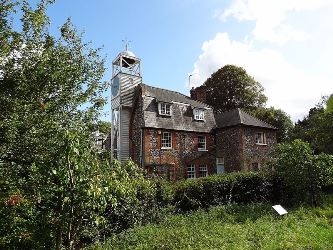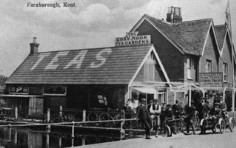

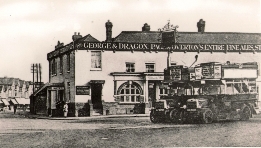
SHIELA GRANT DUFF
In one corner of the St Giles graveyard stands the Lubbock cross, Originally carved as a monument to John Lubbock, the 1st Lord Avebury, it has since served as a memorial to a number of his descendants. Amongst these is Shiela Grant Duff, his grand-daughter, born in the year of her grandfather’s death, 1913. Who was Shiela Grant Duff and what is her connection to High Elms? Her daughter, Penelope Newsome, takes up the story.
| Shiela was the
youngest daughter of Ursula Lubbock and Adrian Grant Duff. Ursula
was the eldest daughter of John Lubbock, the 1st Lord Avebury and
his 2nd wife Alice. Adrian Grant Duff is also remembered on this
memorial stone. She grew up in London but spent nearly all her holidays in her grandmother Alice, Lady Avebury’s house, High Elms. When grown up Lady Avebury lent her The Clock House, High Elms Farm and she lived there with her husband Noel Newsome and their two children, Jasper and Penelope, until her grandmother died in 1947. |
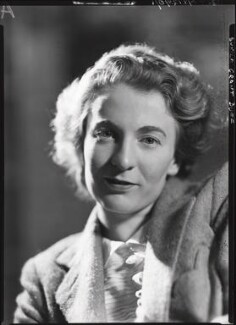 |
Shiela’s soldier father Adrian was killed right at the beginning of World War 1 in the battle of the Aisne and this was a tragedy which affected all of her childhood and informed much of her work after she left Lady Margaret Hall College, Oxford in 1934.
Shiela’s mother had instilled in her, not hatred of Germans, but a hatred of war. However, when Shiela arrived in Paris in 1934, hoping to become a journalist, she had an introduction to Edgar Mowrer, the Paris correspondent of The Chicago Daily News. Mowrer soon made her realise that Germany had not abandoned its militarism and its nationalism and thanks to Hitler having become Chancellor of Germany on 30 January 1933, he was now giving full expression to German desire for expansion.
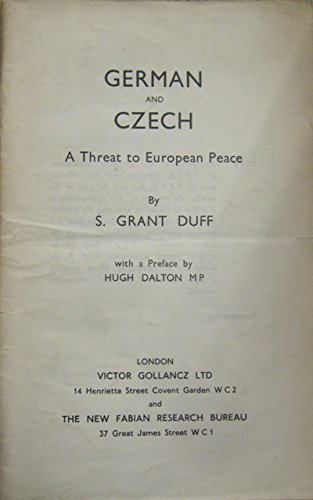 |
 |
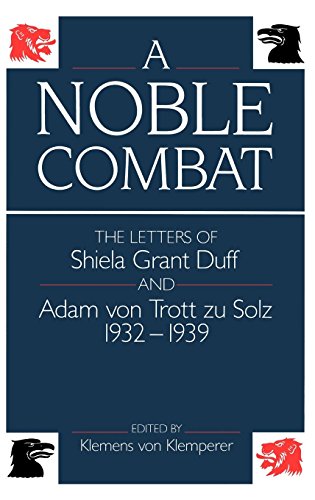 |
| Publications by Shiela Grant Duff, click on images to enlarge | ||
Shiela, thanks to a friend, suddenly found herself reporting lead stories for The Observer on the German success in the Plebiscite in the Saar on 13 Jan 1935. However, she had no payment and no permanent job neither with the Observer nor later with any other newspaper, although she wrote for several including The Manchester Guardian and the Spectator.
She had a private income of £3 a week and, by dint of pretty severe austerity, Shiela lived on this throughout her work until the beginning of the war in 1939. She had some interesting unpaid jobs in England, notably assisting Jawaharlal Nehru during his visit to London in 1936. However, after Hitler’s invasion of the Rhineland in March 1936, Shiela became really worried about possible war. Edgar Mowrer warned that Czechoslovakia was Hitler’s next target so she went to Prague and spent the next 2 years working furiously to avert war, writing for various papers and arguing against the appeasement of Hitler. She became a close adviser to Winston Churchill, a cousin by marriage of Lady Avebury, and in 1938 wrote her book Europe and the Czechs, a Penguin Special which she hoped would help prevent Chamberlain’s signing of the Munich Agreement with Hitler in September 1938. The book came out too late but had large sales. Shiela became much in demand as a speaker.
Shiela has written her detailed memoirs of these ‘five years to war’ in her book The Parting of Ways. She continued to work championing Czechoslovakia and wrote another book in 1942 A German Protectorate; Czechoslovakia under Nazi Rule. She became the first editor of the Czech service in the BBC European Service from 1940 to 1944. She married Noel Newsome, Director of the European Service in 1942.
After the publication of her book The Parting of Ways in 1982 she took part in several BBC documentaries about the 1930s and in discussions about the Munich Agreement, which she had always castigated as a great and foolish betrayal by the British and French. Within the book there are also passages about her life at High Elms.
| Shiela’s other writings include her
correspondence with her great friend Adam von Trott zu Solz,
published as A Noble Combat by OUP in 1988. Adam von Trott was
executed cruelly on 20 July 1944 after his part in the failed plot
to kill Hitler. Shiela had hoped to publish a biography of her grandfather, Mounstuart Elphinstone Grant Duff, but this remains unfinished. She also did a lot of research towards a biography of her grandfather, Lord Avebury. Letters and papers of Shiela’s are in the Bodleian Library, Oxford and much of her research on Mounstuart and most of his letters and papers are in the British Library, London. |
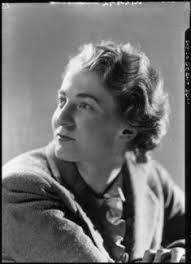 |
In spite of her failure to prevent the Munich Agreement and her horror of WW2, Winston Churchill told Shiela “You have fought well”. Hence her epitaph on the Lubbock family cross in St Giles churchyard: “She fought the good fight”.
Penelope Newsome, August 2019.
Further Reading
Penelope Newsome the author of this article died in 2021. Her ashes are buried beside the Lubbock Cross in St. Giles churchyard.
